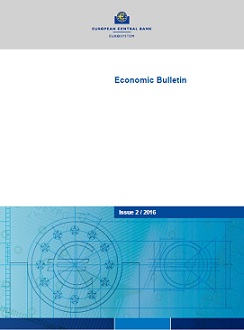Bofinger, Peter, (2016), “Two views of the EZ Crisis: Government failure vs market failure”, Voxeu, 08 April Diagnosing the EZ Crisis is a critical first step towards developing a consensus on how the monetary union should be fixed. This column contrasts views that place the blame mostly on markets with those that place the onus on governments. The fixes necessary for the survival of the euro are – correspondingly – more ‘market discipline’ …Read More
The structural budget balance limbo
Darvas, Zsolt, (2016), “The structural budget balance limbo”, Bruegel, 7 April Revision of an estimate when new data becomes available is quite natural. Also, in some years the methodologies used to estimate potential output and the structural balance were revised. It is better to revise an initial estimate when it turns out later that it was incorrect than to continue using an incorrect estimate. But the problem is that the EU …Read More
Economic Bulletin
European Central Bank, (2016), “Economic Bulletin”, Issue 2/2016, 24 March At its monetary policy meeting on 10 March 2016, based on the regular economic and monetary analyses, the Governing Council conducted a thorough review of the monetary policy stance, in which it also took into account the new macroeconomic projections by ECB staff extending into the year 2018. As a result, the Governing Council decided on a set of measures …Read More
The European Union’s growing innovation divide
Veugelers, Reinhilde, (2016), “The European Union’s growing innovation divide”, Bruegel, 7 April There is a significant divide between the European Union countries with the greatest capacity to innovate, and those with the least capacity to innovate. The difficult convergence process has been proceeding only very slowly and unevenly, and more recently seems to have come to a halt. A particular weak spot for the EU is corporate investment in research; in this …Read More
Annual Report 2015
European Central Bank, (2016), “Annual Report 2015”, 7 April 2015 was a year of recovery for the euro area economy. Inflation, however, remained on a downward path. Against this backdrop, a key theme for the euro area in 2015 was strengthening confidence. Confidence among consumers to boost spending. Confidence among firms to resume hiring and investing. And confidence among banks to increase lending. This was essential to nurture the recovery …Read More
Individualism–collectivism, governance and economic development
Kyriacou, Andreas P., (2016), “Individualism–collectivism, governance and economic development”, European Journal of Political Economy, March While an individualist society prizes personal control, autonomy and individual accomplishments, a collectivist one puts a premium on loyalty and cohesion and imposes mutual obligations in the context of in-groups. It has been argued that, in contrast to collectivism, individualism will promote economic development directly by sharpening individual incentives to invest, innovate and accumulate wealth. In this …Read More
Political economy of fiscal unions
Fidrmuc, Jan, (2015), “Political economy of fiscal unions”, European Journal of Political Economy, December Fiscal unions often use fiscal transfers to counter asymmetric shocks, but such transfers may be politically controversial. I present a model of a two-region fiscal union with region-specific shocks where the threat of secession imposes a limit on fiscal redistribution between regions. I show that both correlation of shocks across regions and their persistence over time are important …Read More
Fixed-term contracts hurt low-skilled workers in the long run
Marinescu, Ioana, García Pérez, J. Ignacio, Vall Castello, Judit, (2016), “Fixed-term contracts hurt low-skilled workers in the long run”, Voxeu, 7 April Short-term contracts are viewed as a way of stimulating youth employment. This column presents evidence that this is the case in Spain, but that such contracts are also detrimental to job stability and lifetime earnings. The negative effects get stronger the longer workers are exposed to fixed-term contracts. Relevant Posts Papadopoulos, …Read More
The effect of economic change and elite framing on support for welfare state retrenchment: A survey experiment
Marx, Paul, Schumacher, Gijs, (2016), “The effect of economic change and elite framing on support for welfare state retrenchment: A survey experiment”, Journal of European Social Policy, February How do economic downturns affect citizens’ support for welfare state retrenchment? Existing observational studies fail to isolate the effect of economic conditions and the effect of elite framing of these conditions. We therefore designed a survey experiment to evaluate how economic change …Read More
Savings and investment behaviour in the euro area
Rodriguez Palenzuela, Diego, Dees, Stéphane, (2016), “Savings and investment behaviour in the euro area”, European Central Bank, Occasional Paper Series No 167, January Although monetary union created the conditions for improving economic and financial integration in the euro area, in the context of the financial and sovereign crises, it has also been accompanied by the emergence of severe imbalances in savings and investment, credit and housing booms in some countries and the allocation …Read More






